BMW iX1 vs Land Rover Range Rover Evoque – Which one offers the better deal?
Two cars, one duel: BMW iX1 meets Land Rover Range Rover Evoque.
Which one wins in performance, efficiency and value for money? Find out now!
Costs and Efficiency:
Looking at overall running costs, both models reveal some interesting differences in everyday economy.
BMW iX1 has a minimal advantage in terms of price – it starts at 41800 £, while the Land Rover Range Rover Evoque costs 43300 £. That’s a price difference of around 1457 £.
As for range, the BMW iX1 performs significantly better – achieving up to 463 km, about 403 km more than the Land Rover Range Rover Evoque.
Engine and Performance:
Under the bonnet, it becomes clear which model is tuned for sportiness and which one takes the lead when you hit the accelerator.
When it comes to engine power, the BMW iX1 has a slightly edge – offering 313 HP compared to 269 HP. That’s roughly 44 HP more horsepower.
In acceleration from 0 to 100 km/h, the BMW iX1 is clearly perceptible quicker – completing the sprint in 5.60 s, while the Land Rover Range Rover Evoque takes 7.20 s. That’s about 1.60 s faster.
In terms of top speed, the Land Rover Range Rover Evoque performs slightly better – reaching 213 km/h, while the BMW iX1 tops out at 180 km/h. The difference is around 33 km/h.
There’s also a difference in torque: Land Rover Range Rover Evoque pulls slight stronger with 540 Nm compared to 494 Nm. That’s about 46 Nm difference.
Space and Everyday Use:
Cabin size, boot volume and payload all play a role in everyday practicality. Here, comfort and flexibility make the difference.
Both vehicles offer seating for 5 people.
In curb weight, Land Rover Range Rover Evoque is hardly perceptible lighter – 1792 kg compared to 1940 kg. The difference is around 148 kg.
In terms of boot space, the BMW iX1 offers minimal more room – 490 L compared to 472 L. That’s a difference of about 18 L.
In maximum load capacity, the BMW iX1 performs distinct better – up to 1495 L, which is about 339 L more than the Land Rover Range Rover Evoque.
When it comes to payload, Land Rover Range Rover Evoque to a small extent takes the win – 600 kg compared to 495 kg. That’s a difference of about 105 kg.
Who wins the race?
The BMW iX1 proves to be wins the duel decisively and therefore becomes our DriveDuel Champion!
BMW iX1 is the better all-rounder in this comparison.
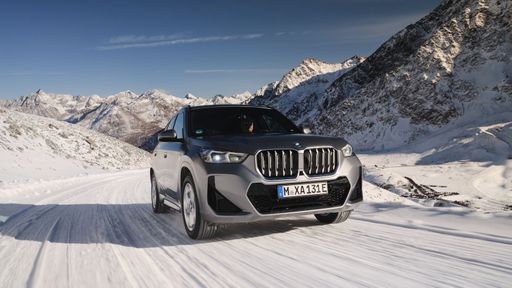
BMW iX1
BMW iX1
The BMW iX1 stands out as a versatile addition to the electric vehicle market, seamlessly combining compact dimensions with advanced electric technology. Its sophisticated design elements and premium interiors ensure a luxurious driving experience, while the vehicle's performance focuses on delivering both efficiency and agility. With enhanced connectivity features and an emphasis on sustainability, this model represents a significant step forward in BMW's commitment to a greener future.
details @ press.bmwgroup.com
@ press.bmwgroup.com
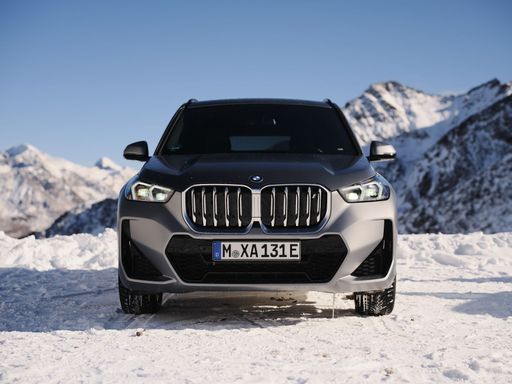 @ press.bmwgroup.com
@ press.bmwgroup.com
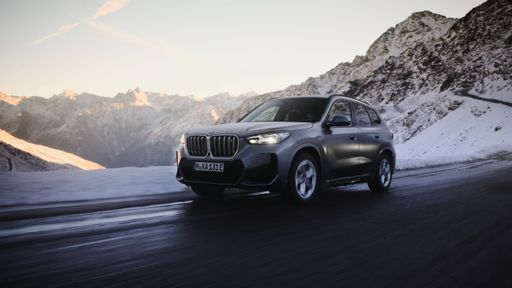 @ press.bmwgroup.com
@ press.bmwgroup.com
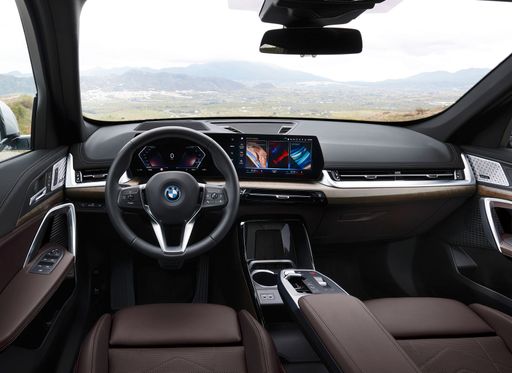 @ press.bmwgroup.com
@ press.bmwgroup.com
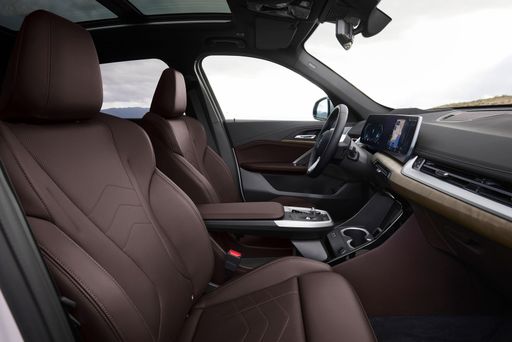 @ press.bmwgroup.com
@ press.bmwgroup.com
Land Rover Range Rover Evoque
The Land Rover Range Rover Evoque combines refined luxury with robust off-road capabilities. Its sleek design and high-quality interior materials create an elegant yet comfortable driving experience. Advanced technology features and superior handling make it a versatile choice for both city and countryside adventures.
details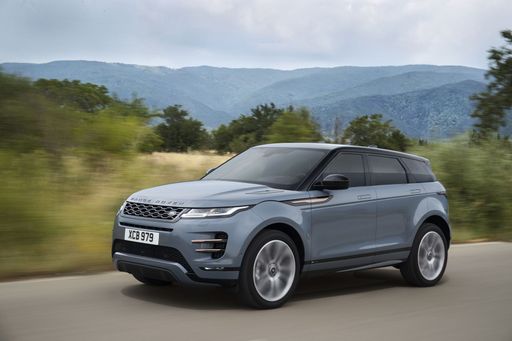 @ media.landrover.com
@ media.landrover.com
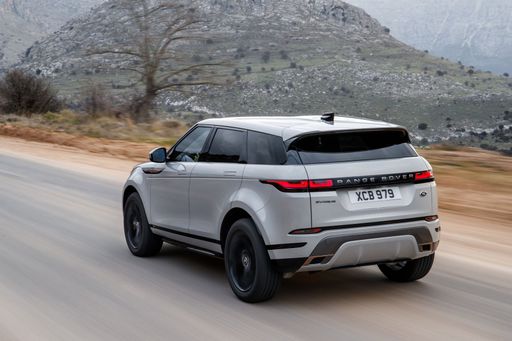 @ media.landrover.com
@ media.landrover.com
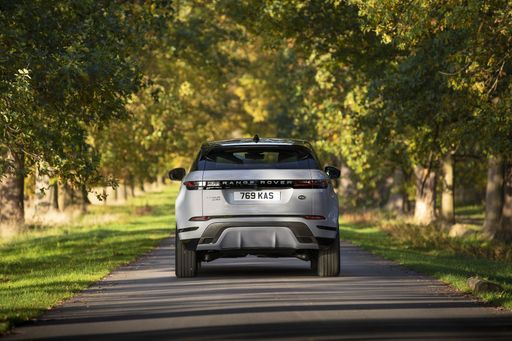 @ media.landrover.com
@ media.landrover.com
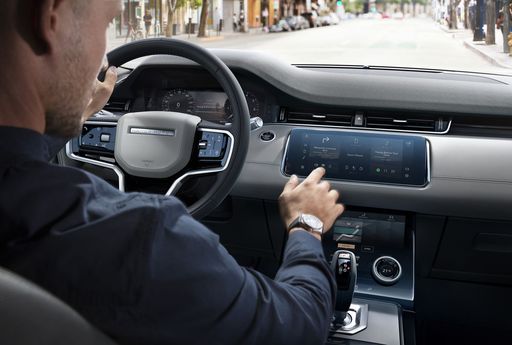 @ media.landrover.com
@ media.landrover.com

|

|
|
|
|
Costs and Consumption |
|
|---|---|
|
Price
41800 - 54600 £
|
Price
43300 - 64800 £
|
|
Consumption L/100km
-
|
Consumption L/100km
3.7 - 7.8 L
|
|
Consumption kWh/100km
15.8 - 17.1 kWh
|
Consumption kWh/100km
-
|
|
Electric Range
436 - 463 km
|
Electric Range
60 km
|
|
Battery Capacity
64.80 kWh
|
Battery Capacity
11.50 kWh
|
|
co2
0 g/km
|
co2
85 - 177 g/km
|
|
Fuel tank capacity
-
|
Fuel tank capacity
57 - 67 L
|
Dimensions and Body |
|
|---|---|
|
Body Type
SUV
|
Body Type
SUV
|
|
Seats
5
|
Seats
5
|
|
Doors
5
|
Doors
5
|
|
Curb weight
1940 - 2085 kg
|
Curb weight
1792 - 2157 kg
|
|
Trunk capacity
490 L
|
Trunk capacity
472 L
|
|
Length
4500 mm
|
Length
4371 mm
|
|
Width
1845 mm
|
Width
1900 mm
|
|
Height
1616 mm
|
Height
1649 mm
|
|
Max trunk capacity
1495 L
|
Max trunk capacity
1156 L
|
|
Payload
495 kg
|
Payload
503 - 600 kg
|
Engine and Performance |
|
|---|---|
|
Engine Type
Electric
|
Engine Type
Petrol MHEV, Diesel MHEV, Plugin Hybrid
|
|
Transmission
Automatic
|
Transmission
Manuel, Automatic
|
|
Transmission Detail
Reduction Gearbox
|
Transmission Detail
Manual Gearbox, Automatic Gearbox
|
|
Drive Type
Front-Wheel Drive, All-Wheel Drive
|
Drive Type
Front-Wheel Drive, All-Wheel Drive
|
|
Power HP
204 - 313 HP
|
Power HP
160 - 269 HP
|
|
Acceleration 0-100km/h
5.6 - 8.6 s
|
Acceleration 0-100km/h
7.2 - 10.3 s
|
|
Max Speed
170 - 180 km/h
|
Max Speed
190 - 213 km/h
|
|
Torque
250 - 494 Nm
|
Torque
260 - 540 Nm
|
|
Number of Cylinders
-
|
Number of Cylinders
3 - 4
|
|
Power kW
150 - 230 kW
|
Power kW
118 - 198 kW
|
|
Engine capacity
-
|
Engine capacity
1498 - 1998 cm3
|
General |
|
|---|---|
|
Model Year
2022 - 2023
|
Model Year
2025
|
|
CO2 Efficiency Class
A
|
CO2 Efficiency Class
G, F, B
|
|
Brand
BMW
|
Brand
Land Rover
|
Is the BMW iX1 offered with different drivetrains?
The BMW iX1 is available as Front-Wheel Drive or All-Wheel Drive.
The prices and data displayed are estimates based on German list prices and may vary by country. This information is not legally binding.
